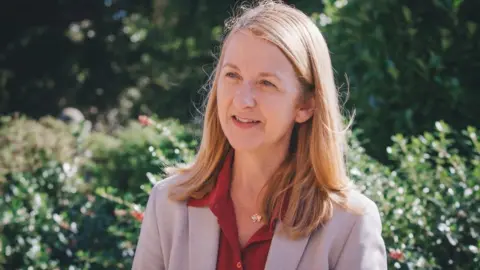Stalking protection orders: Police 'not using' new powers to protect victims
 BBC
BBCNew powers to protect stalking victims are not being used by police, a BBC Wales investigation has found.
In January 2020, stalking protection orders were introduced to make it easier for victims to get support.
But since then only two full orders have been granted in Wales despite 3,000 stalking offences being reported to police.
All four Welsh police forces have been asked to comment on the findings by Eye on Wales.
The data also shows all four forces in Wales have made an application for an order to the courts, or currently have a application pending on behalf of victims.
Only one by Dyfed-Powys Police was granted, with an interim order given to North Wales Police, which later became a full order.
There are calls for better education and training so officers can recognise when action is needed to apply for an order.
Det Ch Insp Richard Yelland, of Dyfed-Powys Police, said there were other options aside from protection orders.
"There are so many tools in our toolbox now thankfully with other legislation," he said.
"In those cases where it's appropriate, we will seek to use a protection order."
'Gives confidence'
Former Miss Wales Sarah Manchipp was stalked for eight months. The perpetrator was caught and has now been jailed.
She told BBC Radio Cymru's Dros Frecwast programme it was difficult to talk about what had happened but she wanted to raise awareness.
"It still affects me, but I want to talk about it and by talking about it I hope it gives confidence to other victims to go to the police.
"To begin with I received Facebook messages from this person saying he was going to rape me and kill me, but I have to say the police were great.
"Officers really took me seriously, but I am disappointed to hear they haven't been using these additional powers - more women need to come forward and talk about their experiences."
'Was persistent'
Bethan - not her real name to protect her identity - is based in Wales and shared her experience of being stalked and reporting it to the police.
"I'd wake up and have 100 missed calls in an hour, floods of text messages. It was persistent," she said.
"He'd also be outside and could tell me what I was wearing and who I was with."
Bethan said the long-lasting effects of the stalker's behaviour were devastating.
"I've got complex PTSD because of this; it made me very ill. I'm constantly on edge all the time."
It took Bethan a long time to recognise she was being stalked. However, once she recognised the behaviours, she reported it to the police several times.
"It was termed 'harassment' when I reported it, but nothing was done so I stopped reporting it," she said.
This was before stalking protection orders were introduced and Bethan feels they could have made a difference in her situation.
"If they were about for me back then, something would have been done - it would have been taken more seriously," she said.
"People should speak out about it now there's these new laws and more support. They're more likely to be believed."
What are stalking protection orders?
 Getty Images
Getty ImagesStalking protection orders were introduced in January 2020 to police forces in Wales and England.
They are civil orders which aim to protect victims, and it is a criminal offence to breach the terms of an order.
Police apply to magistrates for an order, which usually remains in place for two years. The idea is that it can be used quickly and an interim order provides immediate protection while a decision is being made.
When issued, they can include banning an offender contacting a person through social media, through a third party or being within a certain distance of their home or workplace.
There are also solution-based requirements, which aim to tackle the obsessive behaviour traits in the perpetrator. This can include mental health programmes, drug and alcohol support or counselling.
'It's a postcode lottery'
Criminologist Professor Jane Monckton Smith, of the University of Gloucestershire, has been working with Dyfed-Powys Police to train officers to spot the signs of stalking.
"It seems to be a postcode lottery to how these protection orders are used, but I don't think many of the forces are using them routinely," she said.
"It's not necessarily a very simple process but the more police forces use them, the easier that process will be become."
The Suzy Lamplugh Trust is the UK's leading personal safety charity, which also manages the National Stalking Helpline.
Chief executive Suky Bhaker said: "Overall, the introduction of stalking protection orders is proving to be a positive and useful tool for victims of stalking.
"However, there have been a number of cases where clients have not been adequately supported.
"We know that training varies in the police across Wales and England in stalking and what tools are available to help those victims varies as a result."
 Sussex Police and Crime Commissioner
Sussex Police and Crime CommissionerKaty Bourne, the Police and Crime Commissioner for Sussex, is the lead for stalking in Wales and England.
She is also a victim of stalking and has urged other forces to use the orders to protect victims.
"We've issued about 30 stalking protection orders and we've got several others in the pipeline," she said.
"It says to the victim, 'we take you seriously', and that in itself is such a relief that the police are listening to you and believe you."
A Gwent Police spokesperson said: "Gwent Police employs a range of tactics to tackle this serious offence.
"This includes education and awareness training for our frontline staff, which has resulted in the successful prosecution of suspects responsible for stalking.
"We've also assisted the courts by providing support to survivors of this crime who are protected by restraining orders.
"Gwent Police will not tolerate this form of behaviour. We take all allegations of stalking seriously and our officers will investigate them thoroughly."
For details of organisations that provide help and support, visit bbc.co.uk/actionline
Listen to Eye On Wales on BBC Radio Wales on Wednesday 10 March at 18:30 or on BBC Sounds
